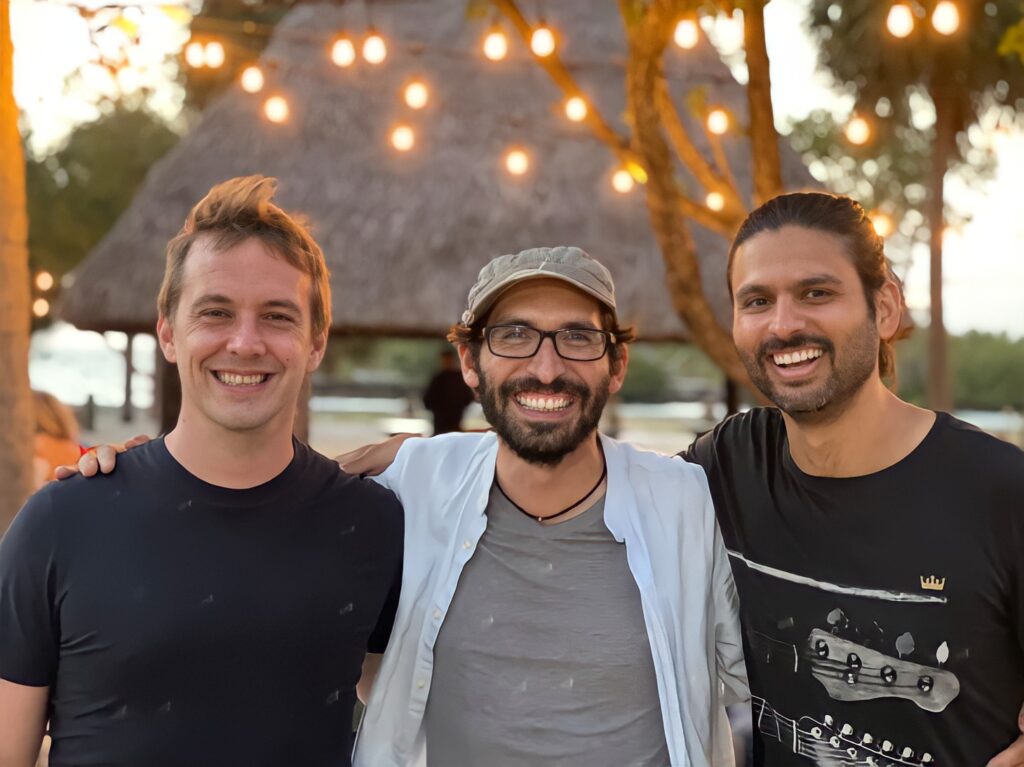SoftBank’s Latin American Fund and GGV participated as new investors, in addition to existing backers Kaszek, BigBets, Nubank CEO David Velez and Kavak CEO Carlos Garcia Ottati.
In May, Justos had announced a $2.8 million seed raise that included participation from Kaszek, one of the largest and most active VC firms in Latin America, and the CEOs of several unicorns including Assaf Wand, CEO and co-founder of Hippo Insurance; Sergio Furio, founder and CEO of Creditas; Patrick Sigrist, founder of iFood and Fritz Lanman, CEO of ClassPass. Senior executives from Robinhood, Stripe, Wise, Carta and Capital One had also put money in the round.
Serial entrepreneurs Dhaval Chadha, Jorge Soto Moreno and Antonio Molins co-founded Justos, having most recently worked at various Silicon Valley-based companies including ClassPass, Netflix and Airbnb. The trio, ironically none of whom are Brazilian, met while playing soccer on an amateur team in San Francisco.
The fact that Justos has yet to officially launch its product and has already attracted such a large group of high-profile investors is notable. According to CEO Chadha, its launch is “imminent,” and the company already has 12,000 “leads” on its waitlist. So far, it has launched a driving test and quoting app and in advance of its formal launch, it has been collecting data from the driving test.
The process to get insurance in the country, by any accounts, is a slow one. It takes up to 72 hours to receive initial coverage and two weeks to receive the final insurance policy. Insurers also take their time in resolving claims related to car damages and loss due to accidents, the entrepreneurs say. They also charge that pricing is often not fair or transparent.
Justos aims to improve the whole auto insurance process in Brazil by measuring the way people drive to help price their insurance policies. Similar to Root here in the U.S., Justos intends to collect users’ data through their mobile phones so that it can “more accurately and assertively price different types of risk.” This way, the startup claims it can offer plans that are up to 30% cheaper than traditional plans, and grant discounts each month, according to the driving patterns of the previous month of each customer.
“We measure how safely people drive using the sensors on their cell phones,” Chadha told me at the time of the company’s last raise. “This allows us to offer cheaper insurance to users who drive well, thereby reducing biases that are inherent in the pricing models used by traditional insurance companies.”
Justos also plans to use artificial intelligence and computerized vision to analyze and process claims more quickly and machine learning for image analysis and to create bots that help accelerate claims processing.
The company also has a social good component. The startup has agreed to support five nonprofit organizations in its first year: Instituto Ayrton Senna (education), AACD (disability), Gerando Falcões (economic opportunity), Casa 1 (LGBTQ) and Conexsus (sustainable development in the Amazon).
It intends to cap its profit so part of the amount that is not used to pay claims is donated to those institutions in its first year of operations.
Says the company: “The partnerships reinforce the insurtech’s disruptive vision, which, as its name suggests, aims to build a more transparent relationship with its customers and effectively contribute to improving society.”
The insurtech plans to use its new capital to continue to hire, and expand its area of operations, as well as toward launching other lines of insurance. The startup has a team of 30 with the goal of having 50 employees by year’s end and 200 by the end of 2022.
Nick Shalek, general partner at Ribbit Capital, said his firm invested in Justos “because of the huge market opportunity and the caliber and technical prowess of the team.”
“With over 20 years of experience in Silicon Valley as entrepreneurs and at Netflix, Airbnb and ClassPass, we believe that the Justos team is well positioned to reinvent insurance in Latin America by focusing on creating customer value, lowering prices and expanding the market,” he wrote via e-mail.









